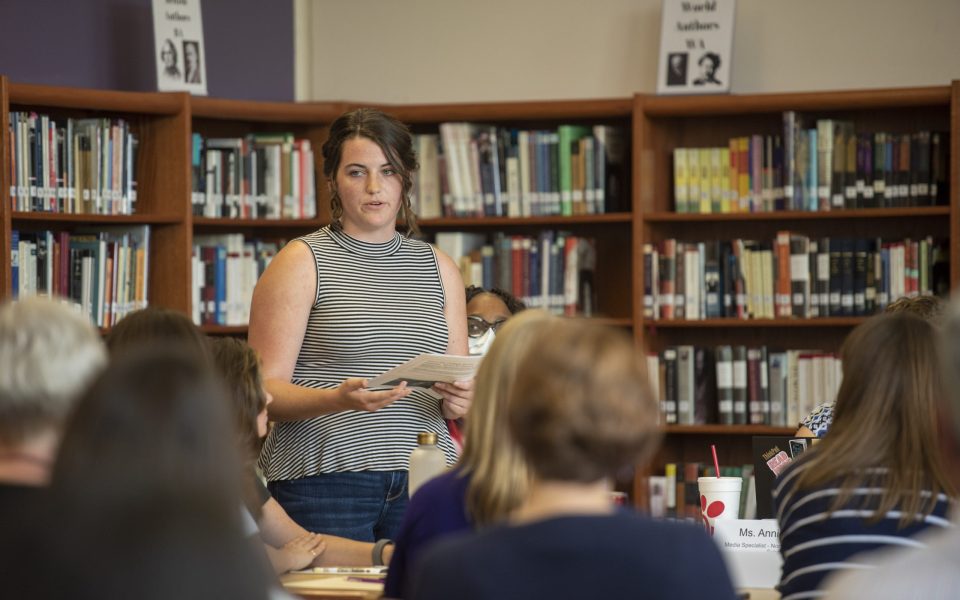Committee votes to retain ‘Salvage the Bones’ in AP Literature, school library
CORRECTION: An earlier version of this story misattributed some of the quotes by committee members. Those errors have been corrected, with regrets.
Photos by Juliet Coen

A determined pair of Guilford County parents lost their case to remove a book from the AP Literature curriculum at Northern High School on Thursday afternoon, after a school advisory committee voted 12-1 to keep it.
For the parents who opposed it, this was never about the book. Based on the objections they levied against it, this was about all books, particularly the ones that challenge a reader’s worldview or force them to empathize with characters whose experience may be vastly different than their own.
Because to distill Salvage the Bones — a gripping tale of survival in the rural South in the days before and after Hurricane Katrina by Jesmyn Ward — down to the dirty parts is a crime against literature itself.
In a perverse bit of irony, two parents read the dirty parts out loud last week at the first part of the hearing. And that was what bothered Savannah Tuhro, the student liaison on the committee, the most.
There were students present at that meeting, she said, who deliberately did not read those passages in the book, which was allowable under guidelines set by the teacher who assigned it, Holly Weaver. In this way, Tuhro rationalized, the students were actually forced to take in the very parts of the book those parents found objectional.
“It unsettled me too,” said Tuhro, a senior who will start Western Carolina University on a full academic scholarship in the fall, “and I read the book.”
She was among three committee members who gave their comments on Thursday, after time ran out at the last meeting. She told the group that she had her concerns about the book at first but then, she said, “I was able to find the artistry.” She added that she and her mother had a three-hour conversation about the book’s significance during a long car ride.



Assistant Principal Monique Wallace quoted the definition of AP courses, saying plainly: “Parents do not decide which materials are suitable for college-level courses.”
Art teacher Katie Sayani, one of the committee members, said that everyone in her AP Art classes had been talking about Salvage the Bones, and that most of them ended up reading it. As a parent of teens, she said that the music, Tiktoks and televised content that teenagers take in unsupervised is “so much more dangerous than the book, facilitated by an amazing educator.”
Before the vote, complaints were addressed one by one:
The book did not meet the definition of “prurient” or “obscene” because titillation was clearly not the intent of those scenes, which is what those words mean. It was appropriate reading material for both the grade level and interest rate of the class, according to two groups that classify such thing. The committee considered that books the complaining parents suggested as substitute, such as Hillbilly Elegy, were “written by white people,” negating the criteria of diversity under which this book had been selected. They reiterated that parents give “implied consent” when they agree to allow their children to take college-level courses. And as to the charge that the school would have to get parents’ permission to screen a film version of Salvage the Bones at school, media specialist Annie Harris called it a “red herring.”
Committee members agreed that films are vastly different than books, but that if the class was a college-level film course, they wouldn’t need parental permission for that, either.



“The facts aren’t what they say they are,” said parent Elena Wachendorfer, one of the mothers who opposed the book, from her seat in the front row as the votes were counted. Wachendorfer declined further comment to a Triad City Beat reporter, but she has told another media outlet that she and Kimberly Magnussen, the other parent, will appeal this decision.
Committee members had three choices: Retain the book in both the course and the school library, retain the book in the course but remove it from the school library, or remove the book from both the course and the library.
Before the vote the committee acknowledged that Salvage the Bones was not currently cataloged in the school library.
“If it passes, will we have to buy one?” one member wanted to know.
“We have plenty of copies now,” Harris said.
Join the First Amendment Society, a membership that goes directly to funding TCB‘s newsroom.
We believe that reporting can save the world.
The TCB First Amendment Society recognizes the vital role of a free, unfettered press with a bundling of local experiences designed to build community, and unique engagements with our newsroom that will help you understand, and shape, local journalism’s critical role in uplifting the people in our cities.
All revenue goes directly into the newsroom as reporters’ salaries and freelance commissions.


Leave a Reply